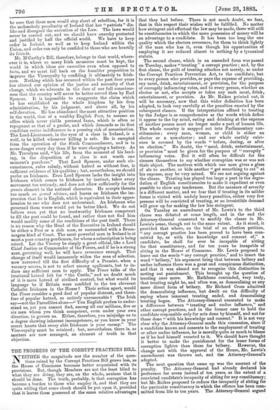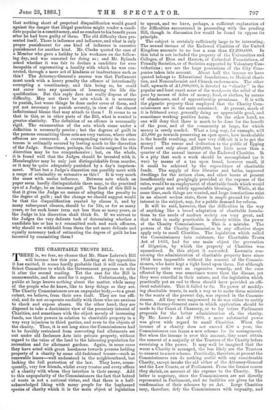THE PROGRESS OF THE CORRUPT PRACTICES BILL.
NEITHER the magnitude nor the number of the ques- tions raised by the Corrupt Practices Bill grows less, as the House of Commons becomes better acquainted with its provisions. But, though Members are not the least blind to what they are doing, they are, on the whole, anxious that it should be done. The truth, probably, is that corruption has become a burden to those who employ it, and that they are quite willing that some check should be put upon it, provided that it leaves them possessed of the same relative advantages
that they had before. There is not much doubt, we fear, . that in this respect their wishes will be fulfilled. No matter how stringent and effectual the law may be made, there will still be constituencies in which the mere possession of money will be an advantage to a candidate. It has been too long the one quality which the electors reverence, for them to think lightly of the man who has it, even though his opportunities of employing it are reduced almost to nothing by a tyrannical statute.
The second clause, which in an amended form was passed on Tuesday, makes " treating " a corrupt practice ; and, by the first clause, the guilt of treating attaches not merely, as under the Corrupt Practices Prevention Act, to the candidate, but to every person who provides, or pays the expense of providing, any meat, drink, entertainment, or provision, for the purpose of corruptly influencing votes, and to every person, whether an elector or not, who accepts or takes any such meat, drink, entertainment, or provision. As Mr. Raikes pointed out, it will be necessary, now that this wider definition has been adopted, to look very carefully at the penalties enacted by the subsequent clauses. If the interpretation affixed to treating by the Judges is as comprehensive as the words which define it appear to the lay mind, eating and drinking at the expense of another person must no longer make a part of human life.
The whole country is mapped out into Parliamentary con- stituencies ; every man, woman, or child is either an elector or a non-elector ; and our whole earthly exist- ence is covered by the words " before, during, or after an election." No doubt, the "meal, drink, entertainment, or provision " must be given for the purpose of " corruptly " influencing votes. But it will often be difficult for the sinners themselves to say whether corruption was or was not - their object. The motives with which one man gives a glass of ale to another, or bids another " get something to eat" at his expense, may be very mixed. We are not arguing against the clause. Treating has played too large a part in the degra- dation of English constituencies to make it expedient or even possible to show any tenderness. But the measure of severity is a different matter, and we fear that if treating in its milder forms is visited with unduly heavy penalties, either very few persons will be convicted of treating, or an irresistible demand will grow up for making the law less stringent.
On Tuesday an amendment of Mr. Lewis's to the third clause was debated at some length, and in the end the Attorney-General consented to modify the clause in Mr. Lewis's sense, though not to the same extent. As it stood, it provided that where, on the trial of an election petition, " any corrupt practice has been proved to have been com- mitted by, or with the knowledge and consent of," a candidate, he shall for ever be incapable of sitting for that constituency, and for ten years be incapable of sitting in the House of Commons. Mr. Lewis proposed to leave out the words " any corrupt practice," and to insert the word " bribery," his argument being that between bribery and undue influence there was a great and conspicuous distinction, and that it was absurd not to recognise this distinction in meting out punishment. This brought up the question of treating once more. Mr. Rathbone contended, very truly, that treating might be, and often was, as demoralising as any more direct form of bribery. Sir Richard Cross admitted the demoralising influence, but dwelt on the difficulty of
saying where innocent treating ended, and demoralising treating began. The Attorney-General consented to make a difference between "treating and undue influence," and other corrupt practices, and in the former case to hold the candidate responsible only for acts done by himself, and not for those done " with his knowledge and consent." It is not very clear why the Attorney-General made this concession, since if a candidate knows and consents to the employment of treating or other undue influence, he is morally quite as much to blame
as if he had himself resorted to it. We should have thought it better to make the punishment for the lesser forms of corruption lighter than those for bribery. However, the change met with the approval of the House, Mr. Lewis's amendment was thrown out, and the Attorney-General's adopted.
The next question that came up was the amount of the penalty. The Attorney-General had already declared his preference for seven instead of ten years, as the extent of a convicted candidate's incapacity of sitting for any constituency; but Mr. Raikes proposed to reduce the incapacity of sitting for the particular constituency in which the offence has been com- mitted from life to ten years. The Attorney-General argued
that nothing short of perpetual disqualification would guard against the danger that illegal practices might render a candi- date popular in a constituency, and so conduce to his benefit years after he had been guilty of them. The old difficulty then pre- sented itself. There is influence and influence, and what is only proper punishment for one kind of influence is excessive punishment for another kind. Mr. Clarke quoted the case of a Member who gave a holiday to his workmen on the follow- ing day, and was unseated for doing so ; and Mr. Rylands asked whether it was fair to declare a candidate for ever incapable of representing a locality with which he was con- nected, through a mere act of kindness or inadvertence such as this ? The Attorney-General's answer was that Parliament must mark with a heavy penalty the offence of intentionally corrupting a constituency, and this being so, he could not enter into any question of lessening the life dis- qualification. But this reply does not really dispose of the difficulty. May not there be acts which it is necessary to punish, lest worse things be done under cover of them, and yet not necessary to punish severely, in view of the almost infinitesimal blame that may attach to them ? It seems to us that in this, as in other parts of the Bill, what is wanted is greater elasticity. The definition of an offence is necessarily rigid. The enumeration of the acts which come under a definition is necessarily precise ; but the degrees of guilt in the persons committing these acts are very various, where other offences are concerned. A corresponding variety in the sen- tences is ordinarily secured by leaving much to the discretion of the Judge. Sometimes, perhaps, the limits assigned to this discretion may be too comprehensive ; but, on the whole,
• it is found well that the Judges should be invested with it. Manslaughter may be only just distinguishable from murder, or it may be quite adequately punished by a day's imprison- ment. What but a Judge's discretion can possibly meet with a range of criminality so extensive as this ? It is very much the same with undue influence. Between acts which on paper seem hardly distinguishable there may, to the practised eye of a Judge, be an immense gulf. The fault of this Bill is that it gives the Judge no means of adapting the penalty to the degree of guilt ; and the change we should suggest would be that the disqualification created by clause 3, and by many subsequent clauses, should be for life, or for so many years, or for such lesser term not less than so many years, as the Judge in his discretion shall think fit. If we entrust to the Judges the very delicate task of determining whether a candidate has or has not committed such and such offences, why should we withhold from them the not more delicate and equally necessary task of estimating the degree of guilt he has incurred by committing them I



































 Previous page
Previous page